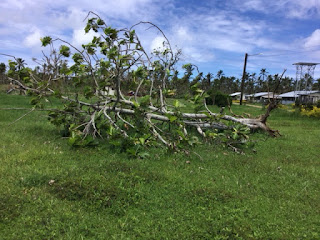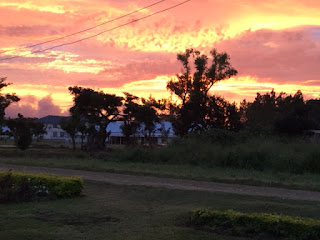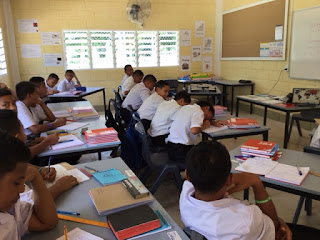News and its good news!
Now there really is news!! After 21 days we have power, well most of the campus does. Our temporary house and our real house both do, unfortunately the class room and staff room I use, don't.
Our cottage is about to be cleaned thoroughly (debugged) and a move is afoot. I have four boys, mops, buckets, disinfectant etc etc and lots of surgical gloves and we will give it a clean to be remembered.
Last night sleeping with a fan was certainly a real treat. And more importantly reading at night, what luxury. Still poor Tonga it has been a really difficult time and initially 80% of the main island of Tongatapu lost power. The clean up continues with rubbish everywhere and not enough man power to do it with any great haste.
For the non-Newingtonian teachers/Staff I have added my report for their school newsletter
In February, our
world was turned upside down – literally – when Cyclone Gita hit Tonga.
The night of the
cyclone we stayed at the principal’s large, safe concrete block house. Solar
powered street light illuminated the torrential rain all night. We woke around
six am, as dawn broke, to see chaos and incredible destruction. Trees and power
lines were down everywhere and several tin rooves were littered around the
grounds. Some of the power poles had snapped in half, other were lying on the
ground and a cat’s cradle of power lines littered the campus.
On investigation of
our little cottage we discovered lots of water inside, a roof leak meant our
bed was afloat, aside from volumes of water and the absence of our carport
completely, we were lucky. The clean-up began; hours of mopping and drying out
rugs, bed linen, books and all our kitchen trappings.
Thus began the week
of February 12th. School was closed for a week and the massive
clean-up of garden and bush refuse started. Truck after truck headed in to the
bush and returned laden with coconuts. All gathered from the ground they were collected
to use for feeding the pigs. An enormous avocado tree was uprooted outside our
little staffroom and crushed the almost ripe crop. A water tower that supplies
the staff residential cottages was located metres away in the bus and the solar
panels nearby were badly mangled by the strong winds. Everywhere trees were
uprooted, some snapped in half, many across fences, onto rooves and huge
puddles of water everywhere created a muddy, messy quagmire.
We moved into the
guest cottage next door to the principal’s house. It was temporary we thought, so we brought little with us from our home. It was fine but no power and
initially no water made for very creative cooking and maintenance of personal
hygiene. Within a few days limited power was available with the installation of
generators. These burst into life and roared away for two hours twice a day.
Combined with the daily whirr of chain saws these sounds became comforting in
the quiet stillness after the cyclone.
One of many trees completely uprooted, water tower in the back ground with no water tank on it
A staff members cottage totally ruined but awaiting repair, new roofing iron from Fiji expected on the next ship
 After 21 days power
was finally restored to Toloa (our district 18kms from the capital Nuka'Alofa) . The buzz of activity was incredible and teams of
workers, families and aid agency workers were tireless in their efforts to get
life back on track. Even now there is an enormous amount still to be done
everywhere in Tonga. Many homes still have no rooves, trees are still blocking
thoroughfares and there is a widening shortage of various essentials. Without
power pumping petrol depended on those lucky enough to have generators so
service stations were open limited hours and some closed. The large sesquicentenary
chapel lost four of its eight whirlybirds exhaust fans, many other areas lost
rooves, louvres, windows, out buildings, gardens lost entire rows of crops and
water pooled everywhere.
After 21 days power
was finally restored to Toloa (our district 18kms from the capital Nuka'Alofa) . The buzz of activity was incredible and teams of
workers, families and aid agency workers were tireless in their efforts to get
life back on track. Even now there is an enormous amount still to be done
everywhere in Tonga. Many homes still have no rooves, trees are still blocking
thoroughfares and there is a widening shortage of various essentials. Without
power pumping petrol depended on those lucky enough to have generators so
service stations were open limited hours and some closed. The large sesquicentenary
chapel lost four of its eight whirlybirds exhaust fans, many other areas lost
rooves, louvres, windows, out buildings, gardens lost entire rows of crops and
water pooled everywhere.
Despite the
challenges and hardships experienced by everyone a cyclone is part pf life in
the Pacific. Having lived in Vanuatu for 5 years I’d experienced many before.
They are still loud, violent and destructive for me. They scar a country
physically and psychologically, they bring out the best in people in some instances
and Tongans are an accepting and faith based population and one Cat 5 cyclone
is no match for their spirit nor resilience.
I am still reconciling the weather, church services in
Tongan, swimming in a pool at a local hotel that has a temperature of about 30
degrees. But the positive aspects of being in Tonga thus far, these far
outweigh the bugs, beetles, mozzies, and other insects (some unidentified!),
coral roads and the 40km speed limit.
More next week, can't possibly be that exciting after the last 21 days.




Comments
Post a Comment